5 Cognitive Skills That Shape Your Child’s Future and How to Enhance Them
Zeba ParkarShare
Cognitive abilities are the building blocks of a child's overall growth, influencing their information processing capacity, problem-solving, decision-making, and understanding of the world. Cognitive skills play a vital role in enabling children to develop the mental tools for learning, communication, and interaction with their world. They not only favor academic success but also facilitate a child's emotional, social, and intellectual development. Cognitive abilities consist of fundamental skills such as memory, reasoning, attention, language, and problem-solving, which are fundamental to learning and functioning in daily life by children.
Enhancing them at an early age has a great influence on a child's future learning and academic achievement. Studies reveal that early cognitive development helps in successful academic performance at school, enhances the understanding of complicated concepts, and facilitates healthy emotional regulation. Although formal schooling is important, it is through active, interactive experiences that children actually build and enhance their thinking capabilities. Interactive learning materials, including board games, flashcards, and everyday life experiences, give children enjoyable and efficient means to practice and develop their thinking capabilities. These activities not only energize a child's mind but also make learning natural, enjoyable, and rewarding.
In this guide, we will investigate five essential cognitive skills that every child requires for healthy development and provide practical, fun ways to cultivate these skills. From work memory and critical thinking to problem-solving and executive function, we'll cover how you can encourage your child's cognitive development using activities of the everyday kind that allow them to realize their full potential.
Understanding Cognitive Skills & Their Importance
Cognitive abilities are the mental processes that allow children to think, comprehend, learn, and recall. These essential skills enable children to process information, make choices, finish tasks, and deal with the world around them. Cognitive abilities determine a child's capacity to concentrate, remember facts, reason logically, and resolve problems—essentials for success in school, social growth, and general intellectual development. Without these basic mental abilities, a child would not be able to grasp new things, have intelligent conversations, or make intelligent decisions in daily life.
A child’s cognitive development starts from birth and continues to evolve as they grow. Early experiences, the surrounding environment, and the activities a child engages in all play a role in shaping and strengthening these cognitive abilities. Healthy cognitive development is supported by consistent mental challenges that stimulate the brain, encouraging it to grow and adapt. When children engage in activities like interactive games, puzzles, and educational board games, they are able to stimulate various brain regions simultaneously. These activities promote not only fun and engagement but also sharpen a child’s critical thinking, problem-solving, and memory skills, which are all key to developing a well-rounded cognitive foundation.
As children mature, they reach specific developmental milestones that reflect their cognitive progress. For instance, by age 3, a child may begin to demonstrate the ability to understand basic concepts, while at age 6, they can manage more complex instructions. Encouraging an active learning environment—whether through board games, flashcards, or real-world exploration—helps children develop cognitive skills at their own pace, allowing them to strengthen their abilities gradually and effectively. Creating a nurturing space where children are encouraged to think critically and independently supports their ability to meet milestones while laying a solid foundation for future solve problems academic and life success.
5 Key Cognitive Skills Every Child Needs
1. Working Memory: The Brain’s Storage System
Working memory is a vital cognitive skill that allows children to hold, process, and use information over short periods. It’s crucial for following multi-step directions, solving problems, and completing tasks efficiently. Working memory plays a significant role in academic activities, such as reading comprehension, where children need to remember what they've read to understand the whole passage, and in math, where they need to retain and apply previously learned concepts. It’s the brain's storage system, helping children retain important information and use it when needed.
Children with strong working memory can process and retain information more effectively, making it easier for them to focus, learn new concepts, and complete tasks without forgetting crucial details. This skill is foundational for problem-solving, as it enables children to keep track of multiple pieces of information and use them to find solutions.
How to Strengthen It:
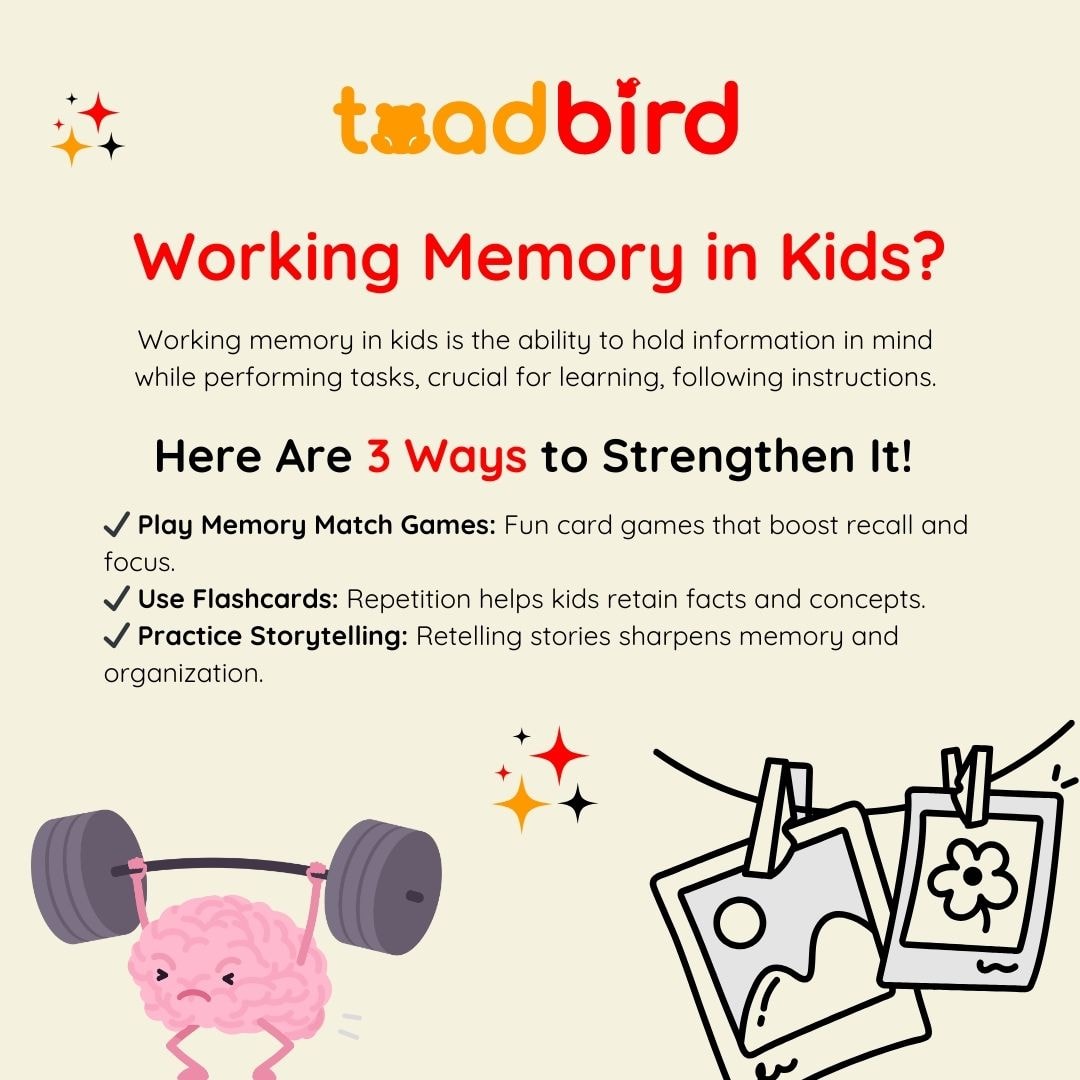
- Board Games Like Memory Match: Games like Memory Match are fantastic for boosting working memory. By matching pairs of cards, children practice retaining and recalling information, which helps strengthen their memory.
- Flashcards: Flashcards are a simple yet effective tool for improving memorization skills. Repeating and reviewing flashcards helps children improve their cognitive functioning and boosts their ability to remember facts and concepts.
- Storytelling Exercises: Asking children to retell a story or recount details challenges them to remember and organize information in their minds. This exercise supports their working memory, helping them focus on details and remember sequences of events.
Strengthening working memory equips children with the ability to process, store, and recall information more effectively, making it easier for them to focus, complete tasks, and succeed academically. As they develop this cognitive skill, they will find it easier to engage with complex ideas and solve problems.
2. Critical Thinking: Enhancing Problem-Solving Abilities
Critical thinking is an essential cognitive skill that empowers children to analyze information, form ideas, and make logical decisions. It enables them to examine situations from multiple perspectives, evaluate outcomes, and determine the best course of action. In academic settings, critical thinking helps children understand complex concepts, make sense of what they learn, and approach problems methodically. Outside of the classroom, it is key to real-world problem-solving, as it allows children to think creatively, adapt to challenges, and find innovative solutions. Whether in school or everyday situations, critical thinking helps children navigate the world with greater confidence and intelligence.
This skill also plays a significant role in academic achievement, as it enhances a child’s ability to solve problems, think independently, and make reasoned decisions. Children with strong critical thinking skills tend to excel in subjects that require analysis, such as math, science, and literature, where they need to evaluate information and draw conclusions.
How to Strengthen It:
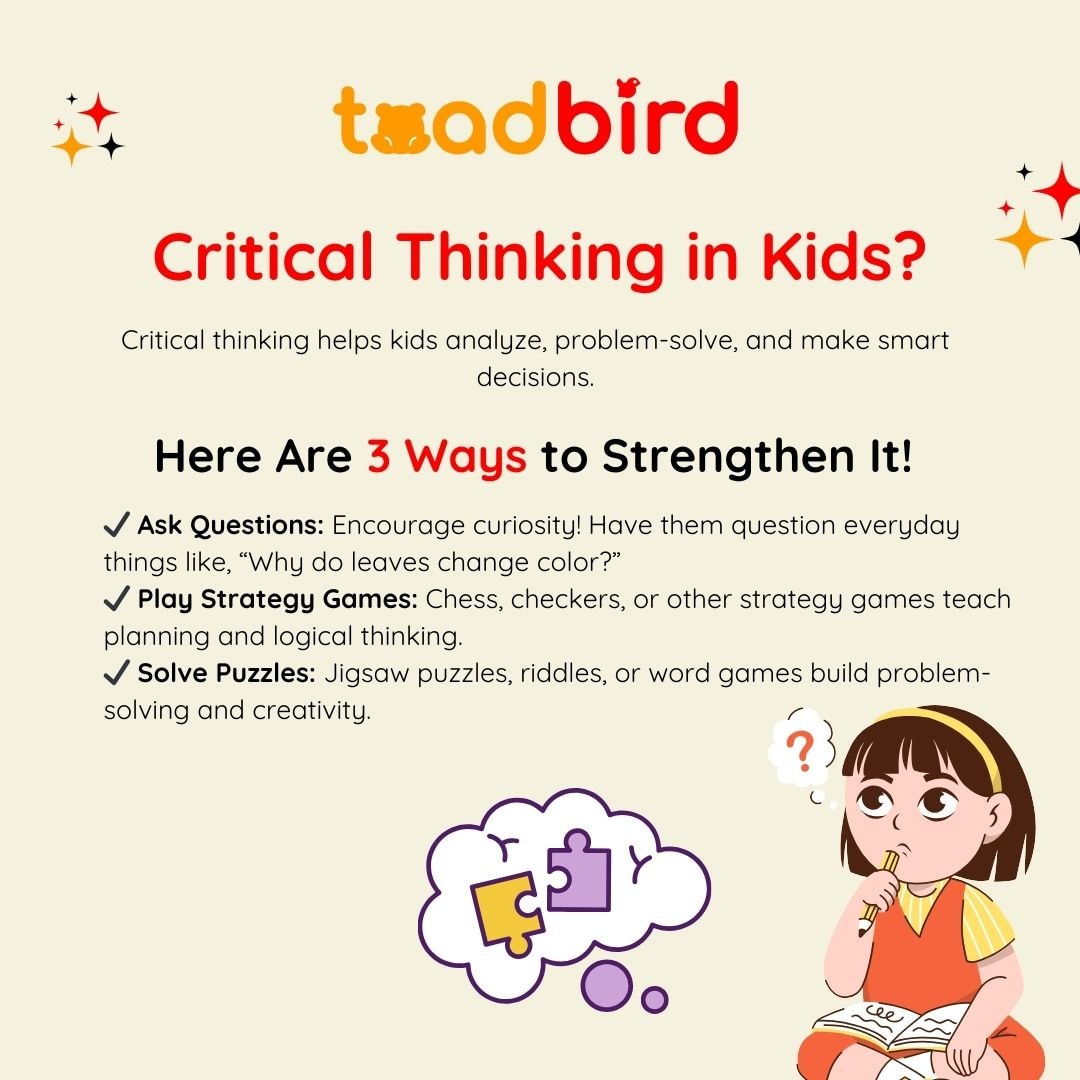
- Encourage Children to Pose Questions About Everyday Items: One way to boost critical thinking is by encouraging children to ask questions about the things around them. Ask them to think about how everyday items work or why certain events happen. This stimulates curiosity and helps them analyze information critically. For example, asking a child, “Why do you think the sky is blue?” sparks a conversation that leads to exploration and reasoning.
- Engage in Strategy-Based Board Games: Board games like chess or Lakshadweep require strategic thinking and decision-making, providing a fun way to develop logical thinking. These games encourage children to evaluate different possibilities, plan their moves, and anticipate consequences, which all strengthen their critical thinking skills. As they play, children learn how to make logical decisions and approach challenges with a thoughtful, step-by-step mindset.
- Provide Puzzle-Solving Challenges: Puzzles are fantastic tools for developing cognitive flexibility—the ability to adapt thinking to new and unexpected situations. By offering children various puzzle types, from jigsaw puzzles to word games, they engage in activities that require them to analyze, think ahead, and consider different solutions to a single problem. These exercises help sharpen their ability to think critically and solve problems creatively.
By incorporating these activities into everyday life, parents can nurture a child’s ability to approach challenges with creativity and logic. Supporting critical thinking through interactive discussions and games prepares children to face future challenges, both academically and in the real world. Through active learning, children become increasingly capable of formulating ideas, solving problems, and making thoughtful decisions.
3. Executive Function: Managing Important Tasks Efficiently
Executive function skills are essential for helping children plan, organize, and regulate their thoughts and actions. These cognitive skills are crucial for time management, self-discipline, and academic focus. Children with strong executive function skills are better equipped to manage tasks independently, stay organized, and stay on track with their goals. This ability is vital for success both in school and in life, as it allows children to juggle multiple responsibilities and complete tasks efficiently, from homework to extracurricular activities.
Executive function also plays a significant role in a child's academic achievement, as it helps them stay focused during lessons, follow instructions, and tackle complex tasks in an organized manner. These skills enable children to break down larger projects into manageable steps and prioritize their work effectively.
How to Strengthen It:
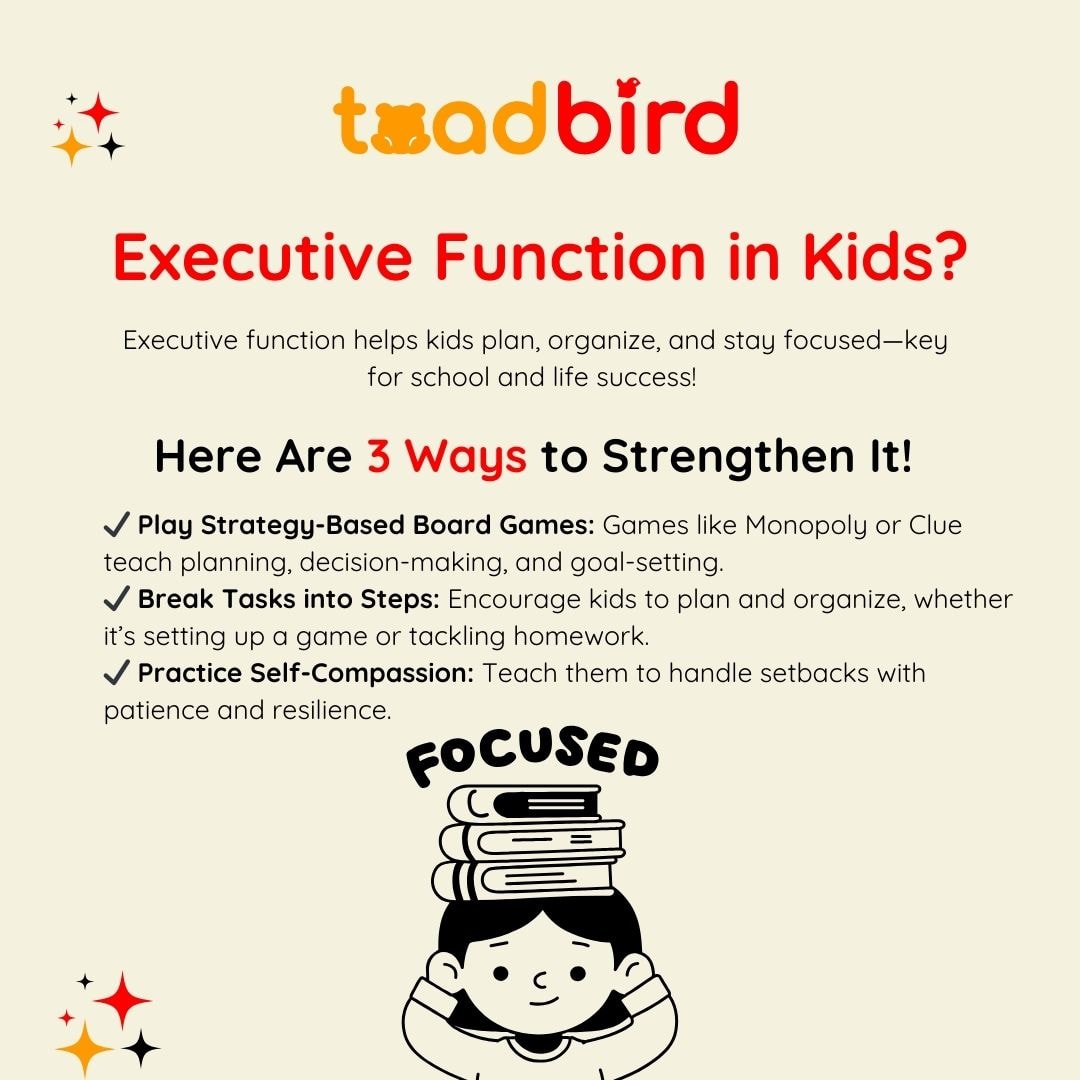
- Board Games with Multi-Step Strategies: Board games that require multi-step strategies, like Monopoly, Clue, Xing or Galaxy Raiders are excellent for developing executive function skills. These games encourage children to make decisions, plan their moves, and consider potential outcomes. The structured nature of these games teaches children how to approach tasks systematically and regulate their actions to reach a goal.
- Planning and Organizing Tasks: Simple tasks like setting up a game or preparing a school project can teach children how to plan and organize. Break tasks down into smaller steps and encourage your child to take initiative in completing them. For example, when setting up a game, children can be tasked with gathering pieces, arranging them in the correct order, and following specific rules. This fosters organizational skills and helps children develop the ability to manage their time and resources effectively.
- Encouraging Self-Compassion: Managing frustration when things don’t go as planned is an important aspect of executive function. Teach children the value of self-compassion and how to handle unfinished projects or mistakes. Encouraging children to take breaks and approach tasks with patience helps them build self-discipline and resilience. This skill ensures they don’t get overwhelmed by setbacks and instead learn how to stay focused on completing their tasks.
By developing executive function skills early on, children are better equipped to stay focused, prioritize tasks, and adapt to challenges. These core cognitive skills help children complete assignments on time and manage the various tasks of their daily lives with greater ease and efficiency.
4. Auditory & Visual Processing: Understanding the Surrounding Environment
Auditory and visual processing are vital cognitive skills that help children make sense of the world around them. Auditory processing refers to a child's ability to interpret and respond to sounds, while visual processing involves recognizing patterns, shapes, and letters. Both skills play a significant role in a child's reading comprehension, ability to follow directions, and overall language development. For instance, children use auditory processing skills to differentiate between similar sounds and to comprehend spoken language. Visual processing helps them decode written text and recognize objects or faces, crucial for early literacy development.
These skills also contribute to a child’s ability to interpret the world around them, making it easier to complete tasks, follow instructions, and engage with others. Developing strong auditory and visual processing abilities sets the foundation for successful academic achievement, as these skills are involved in nearly every learning activity, from reading to following multi-step instructions.
How to Strengthen It:
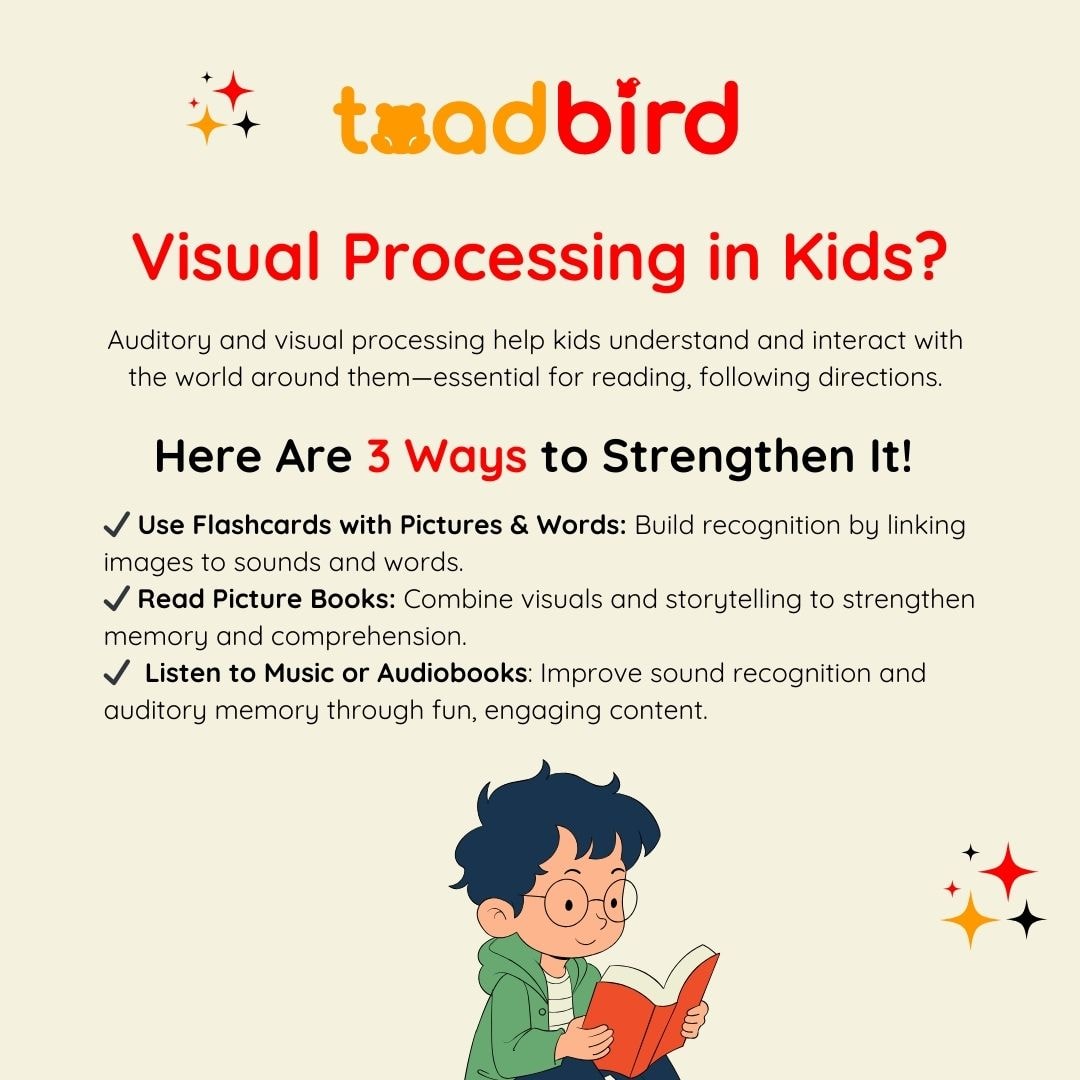
- Flashcards with Pictures and Words: Flashcards are a fun and effective way to build recognition skills. Using flashcards with both pictures and words allows children to strengthen their visual recognition and auditory processing at the same time. As they associate images with words, children practice linking sounds to symbols, which improves both their visual and auditory memory.
- Reading Picture Books: Reading picture books provides an excellent opportunity for children to engage both their visual and auditory senses. As they look at the pictures and listen to the story, children are strengthening their ability to match images with spoken words, which supports both their visual memory and auditory processing skills. Picture books also enhance their comprehension, as children can visualize what they hear, making the story more engaging and memorable.
- Listening to Music or Audiobooks: Incorporating music or audiobooks into daily routines can significantly improve sound recognition. Listening to different types of music or stories helps children develop the ability to identify and differentiate between various sounds, pitches, and tones. Audiobooks, in particular, support auditory memory by encouraging children to remember details and follow along with the story.
By strengthening auditory and visual processing skills, children improve their ability to interpret both sounds and images accurately. These foundational skills support language development and early learning, allowing children to excel in reading, following directions, and engaging with their environment in a more meaningful way.
5. Cognitive Flexibility: Adapting to New Challenges
Cognitive flexibility is the ability to switch between different ideas, adjust to new information, and approach problems creatively. This key cognitive skill is essential for a child’s critical thinking and academic success, as it allows them to adapt to changing situations and think outside the box when solving problems. Whether it’s adjusting to new academic challenges, changing strategies in a game, or navigating social situations, cognitive flexibility helps children make swift and effective decisions.
Children who have strong cognitive flexibility can problem-solve in diverse contexts, from school to daily life. This skill is fundamental for helping children approach tasks with a sense of independence and confidence, as they are able to adapt to new information and challenges without becoming overwhelmed.
How to Strengthen It:
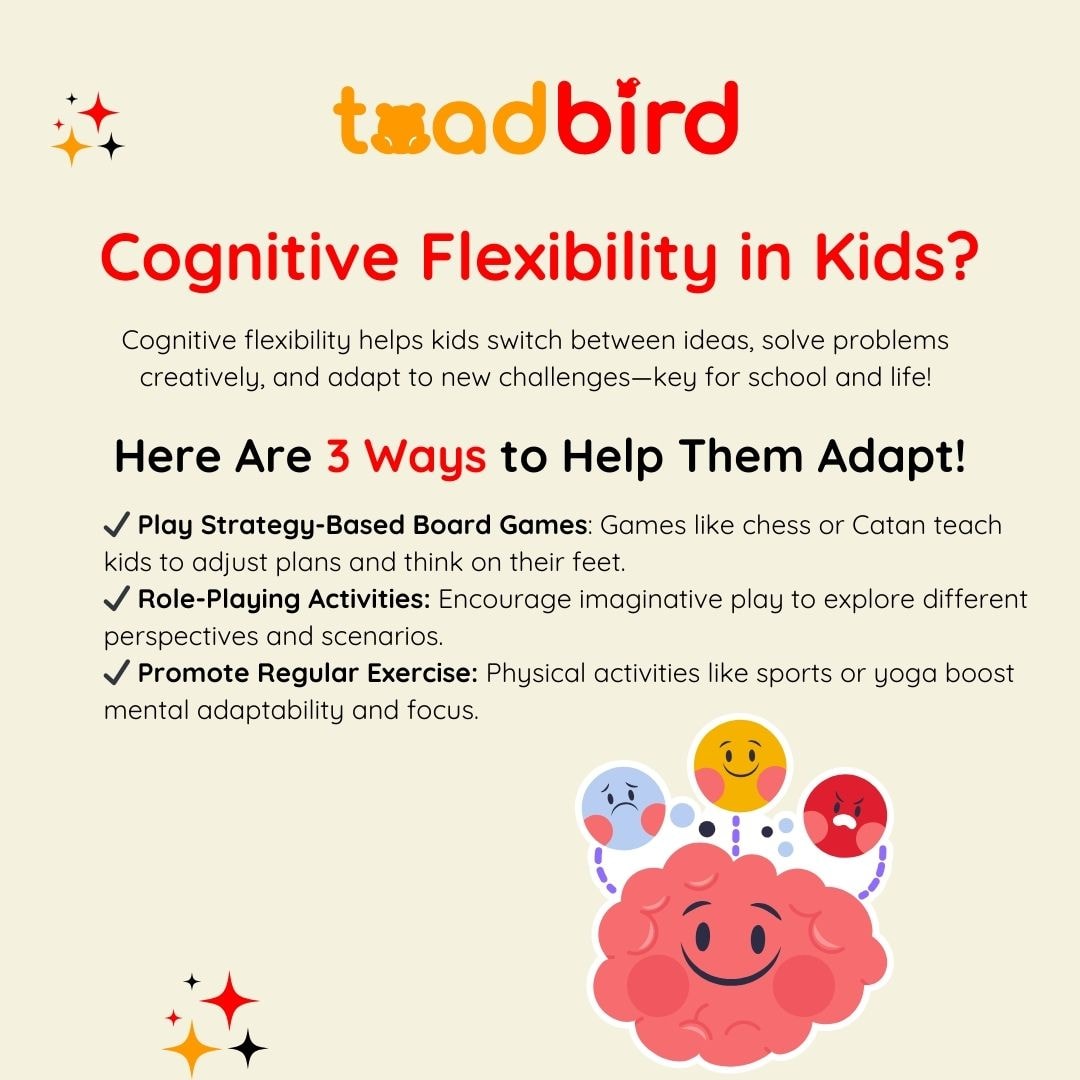
- Board Games that Require Adaptability: Board games that involve strategy and adaptability, such as Chess, Checkers, Catan or other educational strategy board games from Toadbird, are excellent tools for developing cognitive flexibility. These games encourage children to change their plans based on new developments or the moves of their opponents, fostering mental flexibility and the ability to think on their feet. Children learn to reassess situations and make adjustments mid-game, which strengthens their problem-solving and decision-making abilities.
- Role-Playing Activities: Role-playing activities help children explore different perspectives and scenarios, fostering cognitive flexibility. By pretending to be different characters or engaging in imaginative play, children can learn how to adapt their thinking and behavior in various contexts. This also supports emotional intelligence as they understand different viewpoints and can react appropriately in changing social situations.
- Encouraging Regular Exercise: Regular physical activity is not only beneficial for physical health but also for mental flexibility. Exercise helps improve focus, memory, and overall cognitive function, which is crucial for developing cognitive flexibility. Activities like team sports, dancing, or yoga encourage children to adapt quickly to changes and think creatively to solve physical or strategic problems, strengthening their mental adaptability.
By strengthening cognitive flexibility, children develop the ability to think independently, adjust to changes, and tackle challenges with confidence. This skill is essential not only for academic achievement but for fostering a growth mindset that will serve them throughout their lives.
How to Strengthen Cognitive Skills in Daily Life
The Role of Board Games in Cognitive Development
Board games provide a fun, engaging, and structured way to develop cognitive skills. Games that require strategic thinking, memory retention, and problem-solving strengthen a child’s mental capabilities.
Best Board Games for Cognitive Growth:
- Memory-based games improve working memory. Trailblazers is a great memory based game.
- Strategy games build executive function and cognitive flexibility. Xing and Lakshadweep are great strategy games with educational component.
- Word-based games enhance language and auditory processing skills.
Board games are an excellent tool for promoting cognitive development in an enjoyable way.
Flashcards: A Simple Yet Effective Learning Tool
Flashcards are one of the most effective ways to support cognitive growth, particularly in language, memory, and recognition skills.
How Flashcards Help:
- Strengthen long-term memory through repetition.
- Improve visual processing and word association.
- Help children focus for longer periods by keeping them engaged.
Incorporating flashcards into daily learning routines ensures children retain new concepts effortlessly.
Healthy Habits That Support Cognitive Development
1. Adequate Sleep & Nutrition
A healthy diet and adequate sleep play a vital role in a child’s cognitive development. Studies by Harvard University suggest that children who get enough rest perform better in cognitive tasks.
2. Encouraging Physical Activity
Regular exercise, such as outdoor play and sports, helps develop core skills like focus, executive function, and problem-solving.
3. Real-World Learning Through Play
Taking children to interesting places like museums and parks exposes them to new knowledge and experiences, enhancing their cognitive abilities.
Conclusion:
Building cognitive skills is essential for a child’s intellectual development and future success. Encouraging activities that challenge their thinking, such as board games, flashcards, and problem-solving games, helps children develop core cognitive abilities in an engaging way.
By incorporating interactive learning tools, regular exercise, and a nurturing environment, parents can actively support their child's cognitive growth at their own pace.
Invest in activities that promote cognitive development, and watch your child become increasingly capable of tackling academic and real-world challenges with confidence!
Check out the various products including boardgames, flashcards, activity kits from Toadbird to help level up your kid's cognitive skills.